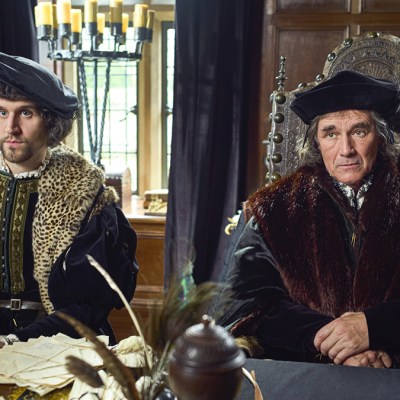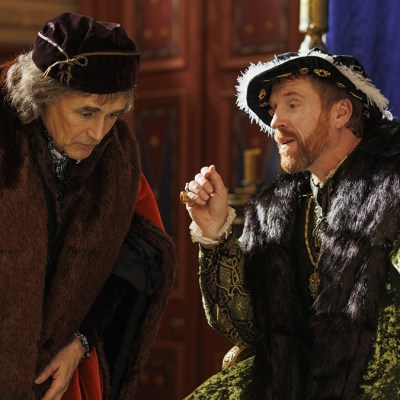Wolf Hall: The Mirror and the Light Episode 3 Review: Defiance
The walls are beginning to close in on Cromwell. Spoilers.

Warning: contains spoilers for The Mirror and the Light episode three.
Henry’s love is a dangerous thing. The protection it brings is equalled only by the threat that comes with its removal. Wolsey learned that. So did Anne Boleyn. Jane Seymour was beginning to learn it before pregnancy granted her this reprieve. And now Cromwell feels it in a queasily tense episode that shows the walls closing in on him.
Having taken a princely punt on Cromwell and created him a lord in defiance of the English nobility, Henry is now in a difficult position. To save face in public, he needs to stand by his man, but Cromwell’s ability to wave a magic wand over the king’s problems is waning. Indeed, Cromwell is one of the king’s problems. Noble Catholic families the Poles and the Courtneys are gunning for the Lord Chancellor and his Reformation. They’ve spread rumours to put a target on Cromwell’s back, in the hope of taking out Henry at the same time and restoring England to Rome.
Modern audiences know how it ends for Cromwell, and increasingly in Wolf Hall: The Mirror and the Light, so might he. We were greeted by a sorry sight (though one that, like every shot in this beautifully composed drama, looked like a painting you could hang in a gallery) at the start of an episode in which Cromwell didn’t just suffer political, but also personal pain.
Like Henry’s, Cromwell’s sleep was also being troubled by his conscience. Bereft in bed, he replayed Dorothea’s untrue accusation of disloyalty to her father Wolsey (who no longer appears to him), and later, was visited by nightmares of Anne Boleyn’s ladies presenting him with her bloody head. Cromwell knows the lies he told to avenge Wolsey and bring Anne to the scaffold, and now, as someone who loves the Gospel, they’re plaguing him. It’s one reason he stumbled over calling himself “an honourable man” to his son Gregory, and changed to “a man of [his] word”.
The scene at Gregory and Bess’ wedding was more heartbreak for Cromwell. His humiliated son (secrets never stay secret among this gossip-obsessed lot) bitterly implored his father to stay away from the wife he now knows only accepted him by default, having first thought that she’d won a far greater prize. Marriage to wealthy Lord Cromwell, the second most powerful man in England, rumoured as a match for the king’s daughter, and whose heirs the king said would follow him onto the throne if he decreed it? Bess would have won the marriage lottery. No wonder she was snippy when she learned she’d be Thomas’ daughter and not his wife.
Before they died along with his wife of “the sweating sickness”, the Lord Chancellor did once have daughters. And now he does again in Bess, and in Jenneke from Antwerp, a character invented by Hilary Mantel to stand in for the illegitimate daughter Cromwell was rumoured to have had but of whose existence there’s no evidence. That soap opera-style cliffhanger gave Mark Rylance his first “Doof Doof” closer in The Mirror and the Light – fitting for such an eventful episode.
From the Lincolnshire uprising to the fall of York, “Defiance” was packed with incident, and with themes that proved depressingly relevant to our times. Misinformation abounded. The rich used the poor to do their violent bidding, manipulating the people through lies and fear. They may well scare their kids with tales of Cromwell in the north, they’ve probably been told he’s coming to eat their pet cats. As Cromwell asked Dorothea last episode, how do you oppose a fixed opinion that’s held on to regardless of evidence or reason? How also, do you reply to bad faith rumours invented to sow disorder, and enemies who invent bogeymen to suit their own agenda?
If Cromwell couldn’t find an answer, sadly, there can’t be much hope for the rest of us. This character is a masterful operator, and watching him at work is still a pleasure, if a bittersweet one in the knowledge of what’s to come. Cromwell’s quick tongue and quicker mind are enviable, even if his perilous position at court is increasingly not. The air of amused tolerance he affects when dealing with schemers like rabble-rousing Chapuys and the Portuguese ambassador is ultra enjoyable, as is his keen way with a threat. The way he left Chapuys, mouth gaping like a drowning fish, with the promise of retaliation should his boss Emperor Charles V follow through with the put-Pole-on-the-throne plan, was to be savoured.
Less so were the nauseating moments when circumstances swirled beyond Cromwell’s control and the king turned on him. Frustrated, furious, and settling the blame for England’s unrest on Cromwell’s shoulders, Damian Lewis was terrifying in this episode. His mercurial temper was underlined with the reappearance of Patch/Sexton the fool. Like Henry’s daughter Mary, Sexton had been returned to court after banishment (he’d insulted Anne Boleyn before it was cool). It’s hard to say which is scarier, Henry smiling at you or screaming at you. Neither one is safe.
Wolf Hall: The Mirror and the Light continues on Sunday December 1.


